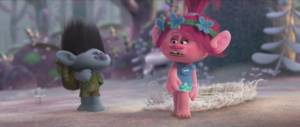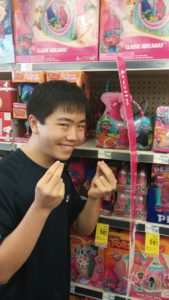Movie Review – Trolls: Trolling for Cash
Perry Chen’s movie review of Trolls: Trolling for Cash by DreamWorks Animation.
“Once upon a time, in a happy forest, in the happiest tree, lived the happiest creatures the world has ever known: the Trolls.” Trolls are tiny fluorescent-haired creatures who live in a culture saturated with manic festivity. Their antithesis, the gargantuan puke-colored Bergens, can only experience happiness in life by eating them. With this premise, conflict is inevitable.
Twenty years since escaping Bergen captivity, Troll princess Poppy (Anna Kendrick) throws a big party on the anniversary of their escape, much to the objection of Branch (Justin Timberlake): a paranoid gray Troll who fears the festivities will attract Bergens. Unsurprisingly, the prediction is fulfilled, and many of Poppy’s friends are pocketed, prompting Poppy and Branch to embark on a quest to save her friends. Along the way, they barter with Bridget (Zooey Deschanel), the Bergen maid guarding the captives, to help her seduce the young Bergen King if she aids the Trolls in their escape. However, Poppy’s imprisoned love interest Creek (Russell Brand) strikes a deal of his own, selling out his brethren to save his skin. Many other asinine events occur during their “hero’s journey,” but I’ll spare you the details.
Many an unsuspecting parent’s judgement may be clouded by the neon rainbows, sparkling glitter, and an endless barrage of pop music that “Trolls” heaps onto the big screen, judging the movie only as a harmless, lighthearted comedy for kids. While I personally have nothing against such mindless entertainment, one must keep in mind the impressionable nature of children. Thus, when animation films are expressly geared towards young audiences, special care must be taken to ensure that the messages of the film are healthy and meaningful. More than any villain or side character, the protagonist of a children’s film is deserving of the most scrutiny in this regard, because they are the individuals whom kids empathize most strongly with. “Trolls” squandered an opportunity to positively inspire and empower the audience of young girls who constitute the film’s target audience. Poppy, the protagonist of “Trolls”, is a despicable and manipulative individual whom nobody should aspire to be.
Poppy’s pink cotton-candy exterior belies a twisted Machiavellian nature. Her manipulation may go unnoticed to the vast majority of adults, as older audiences tend to reserve their analytical goggles for live action flicks. On the other hand, most children don’t suspend disbelief to the same extent while watching cartoons; this allows them to focus on certain subtleties of characters’ actions and behaviors that adults often miss. Even though the felt-textured visual style of the film portrays Poppy as cute and harmless, assessing her character in an unbiased way reveals that her actions may convey potentially harmful messages to children. Within the context of the film, her manipulative actions target the most vulnerable outcast members of society – Branch and Bridget. In both relationships, we see many of the same psychological tactics being employed.
A prominent example of her manipulation is when she uses the hurt and rescue technique. The principle behind this is simple: push the victim into the water, and throw them a rope. A person fighting for their life is more likely to cave into demands that offer perceived relief from their circumstances. When Princess Poppy barges into Branch’s home, relocating all of the displaced Troll villagers into his Bergen-proof bunker, many viewers may misconstrue her action as done out of caring for her subjects. In fact, the princess places greater priority on saving a handful of her friends than on the wellbeing of all other Trolls. Audiences may fail to realize that the Trolls only serve as Poppy’s tools for blackmailing Branch into obeying her. By using the Trolls to destroy Branch’s property and eat all his food, Poppy effectively made it impossible for Branch to feel safe in his own home. The severity of this act is dampened by the cheerful visual style, but imagining the same events in a live action scenario provides a more sobering perspective. Poppy used her subjects to forcibly evict Branch from his own home, leaving him no choice but to follow her.
Not all her tactics were as obvious as the example of her blackmail and intimidation. In abusive relationships, the abuser does not always take an aggressive stance. A victim can be just as easily manipulated through guilt tripping, using threats of self harm or suicide. After Poppy sets off to save her friends, Branch is forced to come to her rescue when he finds her poisoned, unconscious, and surrounded by bloodthirsty spiders. Finding Poppy in this state induces a feeling of profound regret within Branch, making him feel that it was his fault for not being there to protect her. This ensures that Branch will always feel responsible for her safety, for fear of having to live with the guilt if she were put in harm’s way.
Even Poppy’s seemingly charitable relationship with Bridget was all just an act. While she did a huge favor for the Bergen girl by transforming her into a “total hottie” and landing the date of her dreams, Poppy never genuinely cared about Bridget. After their bargain was fulfilled and Poppy’s friends were released, Bridget expected that Poppy would still be willing to help her on her second date. However, Poppy coldly cast the Bergen girl aside, telling her to resume life as a drab wallflower, “Just be yourself.” This shows that Poppy is a character who throws away her friends without remorse, once they are no longer of use to her.
Poppy is not only a generally unlikable character, she sets a dangerous example for children to follow. Any parent would agree that kids are highly impressionable, with an innate ability to imitate a multitude of mannerisms – even after seeing them only once. This is most true of movie protagonists, the individuals whom kids most strongly empathize with. In this way, Poppy is a wolf in sheep’s clothing; she is a character whose cute exterior conceals her abusive, Machiavellian, and narcissistic qualities. Her actions unintentionally teach children how to utilize harmful manipulative techniques. But her character only turned out this way due to the laziness of the filmmakers. It’s far easier to create a cute, shallow, marketable character without worrying about how children would empathize with her. Poppy is definitely not the only character indicative of the writers’ sloppiness. Creek, the traitorous villain Troll, is a walking bundle of cliche and predictability, who served only to bolster the film’s marquee and ticket sales through his voice actor Russell Brand.
Such lackluster storytelling in “Trolls” is only a consequence of a broader shift in what DreamWorks now prioritizes as a studio. The success of the films and their storyline is secondary, as the marketing team turns to Troll-themed merchandise to achieve their ultimate goal – turning a profit. Telling a fresh, new, and inspiring story is always a risk, and it appears that DreamWorks no longer wants to take that risk. “Trolls” aims to sell its characters beyond the big screen, and onto the store shelves. It’s no coincidence that “Trolls” released right as Minions have all but faded from popularity. DreamWorks aims to fill this vacancy by resurrecting the dead cultural icon of Troll Dolls and giving them a fresh new face appealing to the 21st-century child.
This shift foreshadows an ominous future of the animation industry as a whole. Instead of merchandise serving as the film’s icing on the cake, big studios such as DreamWorks are catching onto a trend of creating the film to sell merchandise. The release of “Trolls” shows that DreamWorks is very much willing to give up good storytelling in order to make money. Such choices by the animation industry result in studios sticking to safer stories, such as sequels to successful franchises, or films based on established cultural icons like the “Trolls,” without caring as much about the kinds of stories they tell or the messages they spread. I would hate to see the day when DreamWorks Animations evolves into a studio that only produces films devoid of introspection. It’s downright shameful to think that “Trolls” comes from the same studio that created the “How to Train Your Dragon” and “Kung Fu Panda” (barring the third one) franchises. Clearly, “Trolls” lacked a crucial element that made the other two so special: respect for storytelling and the medium of animation. Of the major studios of animation, only the relatively smaller ones such as Laika, Cartoon Saloon, and Studio Ghibli prize animation and storytelling above all else. Respect for the art form is what separates timeless classics from films like “Trolls” that will be forgotten in the span of weeks.
I give “Trolls” one starfish. 
______________________________________________________________
 Perry Chen is the youngest award-winning film/ entertainment critic & animator, artist, speaker, and entertainment personality. He started writing movie reviews at 8 using a kid-friendly starfish rating system, under the guidance of his mom Dr. Zhu Shen and his 3rd grade teacher Ms. Harris. Perry’s debut on the CBS Evening News in 2009 made him a national sensation. He has been featured extensively on local, national, and international media, including NPR, Fox, CNN, NBC, The Guardian, The China Press, and many more. He has interviewed prominent filmmakers at film festivals, red carpet premieres, and press junkets. He won a prestigious “Excellence in Journalism Award” at the San Diego Press Club in 2010 as its youngest member. Perry currently writes movie reviews for the Animation World Network, San Diego Union Tribune, Amazing Kids! Magazine, and his own Perry’s Previews website with a combined readership of over 2 million worldwide. Perry and his family live in the community of Carmel Valley San Diego.
Perry Chen is the youngest award-winning film/ entertainment critic & animator, artist, speaker, and entertainment personality. He started writing movie reviews at 8 using a kid-friendly starfish rating system, under the guidance of his mom Dr. Zhu Shen and his 3rd grade teacher Ms. Harris. Perry’s debut on the CBS Evening News in 2009 made him a national sensation. He has been featured extensively on local, national, and international media, including NPR, Fox, CNN, NBC, The Guardian, The China Press, and many more. He has interviewed prominent filmmakers at film festivals, red carpet premieres, and press junkets. He won a prestigious “Excellence in Journalism Award” at the San Diego Press Club in 2010 as its youngest member. Perry currently writes movie reviews for the Animation World Network, San Diego Union Tribune, Amazing Kids! Magazine, and his own Perry’s Previews website with a combined readership of over 2 million worldwide. Perry and his family live in the community of Carmel Valley San Diego.
Dr. Zhu Shen’s love for the movies started when she was a young girl, growing up in China during the Cultural Revolution where watching movies was the only entertainment available to the masses. Her journey to become a filmmaker took a convoluted path. She studied medicine at Peking Union Medical College before coming to the US and earning a Ph.D. in biochemistry from University of Colorado, and then an MBA from Cornell University’s Johnson School. She is a producer of the upcoming documentary feature “Average Joe on the Raw,” about journey into raw food and health. Dr. Shen is also an award-winning biotech executive, author, speaker, China business expert featured on national and trade media including CBS, Fox, Business Week, Pharmaceutical Executive, and more. She has worked at IBM, Bayer, Chiron, Immusol, and is the CEO of BioForesight, consulting on cross-Pacific life science business.












You must be logged in to post a comment Login